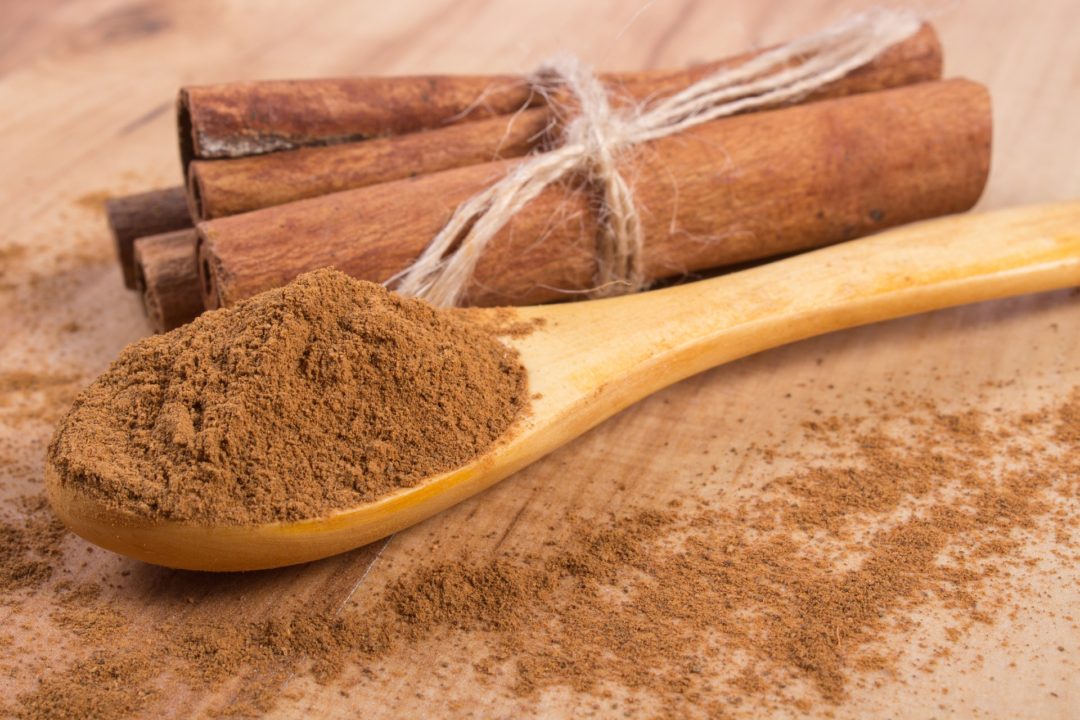
Home » Herb of the Month: Cinnamon
Herb of the Month: Cinnamon

February 19, 2021
Cinnamon, also called Ceylon cinnamon, is an evergreen tree of the laurel family. Native to Sri Lanka, it is also cultivated in the West Indies and in South America. The pungent spice with its sweet and savory aroma comes from the dried inner bark, and it was once more valuable than gold.
In Egypt, cinnamon was sought for embalming and religious practices. It also has been used since 2000 BC in Europe, where it was used for religious rites and as a flavoring (1), as well as to treat conditions like coughing, arthritis and sore throats (2). Cinnamon has been used as a medicine in traditional Ayurvedic and Chinese medicine for centuries, and it continues today to grow in popularity, becoming a staple in more and more categories with each year of use.
Today, cinnamon is the second most popular spice (after pepper) in the United States and Europe. As a spice, cinnamon is available in bark pieces, whole, and in powdered form, and it has a very long shelf life. It is used as a flavoring for foods, sweets, bakery goods, and beverages. The essential oil of cinnamon is also very popular in foods, as well as perfumes, creams and lotions, candles, air fresheners, and alcohol.
It also is a research-backed natural remedy. In one 40-day trial of 60 people with type 2 diabetes, intake of 1, 3, or 6 g of cinnamon per day was shown to reduce serum glucose, triglycerides, LDL cholesterol, and total cholesterol in people with type 2 diabetes. The study suggests that the inclusion of cinnamon in the diet of people with type 2 diabetes will reduce risk factors associated with diabetes and cardiovascular diseases (3).
Around the world, many people use Cinnamon supplements for digestion, blood sugar issues, strengthening appetite, and breathing conditions like bronchitis. Essential oil of cinnamon is popular for its sweet relaxing fragrance. It is also known to have antibacterial and antifungal properties. Cinnamon is naturally strong, and should be diluted, or added to carrier oil. Before using it topically, users should test a small amount to see if a skin reaction develops.
ReferencesBritannica-Cinnamon Herb and SpiceMedical News Today- What are the Health Benefits of Cinnamon.
Medically Reviewed by Katherine Marengo LDN, RD
Written by Yvette Brazier-January 2020National Library of Medicine
Cinnamon improves glucose and lipids of people with Type 2 Diabetes.
Alam Khan1,Mahpara Safdar,Mohammad Muzaffar Ali Khan,Khan Nawaz Khattak,Richard A Anderson
In Egypt, cinnamon was sought for embalming and religious practices. It also has been used since 2000 BC in Europe, where it was used for religious rites and as a flavoring (1), as well as to treat conditions like coughing, arthritis and sore throats (2). Cinnamon has been used as a medicine in traditional Ayurvedic and Chinese medicine for centuries, and it continues today to grow in popularity, becoming a staple in more and more categories with each year of use.
Today, cinnamon is the second most popular spice (after pepper) in the United States and Europe. As a spice, cinnamon is available in bark pieces, whole, and in powdered form, and it has a very long shelf life. It is used as a flavoring for foods, sweets, bakery goods, and beverages. The essential oil of cinnamon is also very popular in foods, as well as perfumes, creams and lotions, candles, air fresheners, and alcohol.
It also is a research-backed natural remedy. In one 40-day trial of 60 people with type 2 diabetes, intake of 1, 3, or 6 g of cinnamon per day was shown to reduce serum glucose, triglycerides, LDL cholesterol, and total cholesterol in people with type 2 diabetes. The study suggests that the inclusion of cinnamon in the diet of people with type 2 diabetes will reduce risk factors associated with diabetes and cardiovascular diseases (3).
Around the world, many people use Cinnamon supplements for digestion, blood sugar issues, strengthening appetite, and breathing conditions like bronchitis. Essential oil of cinnamon is popular for its sweet relaxing fragrance. It is also known to have antibacterial and antifungal properties. Cinnamon is naturally strong, and should be diluted, or added to carrier oil. Before using it topically, users should test a small amount to see if a skin reaction develops.
ReferencesBritannica-Cinnamon Herb and SpiceMedical News Today- What are the Health Benefits of Cinnamon.
Medically Reviewed by Katherine Marengo LDN, RD
Written by Yvette Brazier-January 2020National Library of Medicine
Cinnamon improves glucose and lipids of people with Type 2 Diabetes.
Alam Khan1,Mahpara Safdar,Mohammad Muzaffar Ali Khan,Khan Nawaz Khattak,Richard A Anderson
Related Articles

Dr. Jeffrey Burke is a Naturopathic Practitioner, a Master Herbalist, National Educator, and Host of the Honest Health Podcast with Jeffrey Burke.
www.drjeffreyburke.com
Recommended For You
Most Popular
The Magazine
Information
About Us
NOTE: WholeFoods Magazine is a business-to-business publication. Information on this site should not be considered medical advice or a way to diagnose or treat any disease or illness. Always seek the advice of a medical professional before making lifestyle changes, including taking a dietary supplement. The opinions expressed by contributors and experts quoted in articles are not necessarily those of the publisher or editors of WholeFoods.
© Copyright 2025 WFC, Inc. All Rights Reserved.







